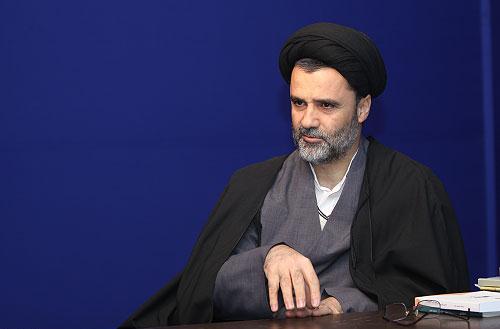
RNA – Speaking at a conference entitled “Infiltration and the Imperialist Agenda,” at Qom’s Mofid University, Hujjat al-Islam Sayyed Mahmoud Nabavian, the representative of Tehran in the Iranian parliament, explained that after the Islamic Revolution, the United States formed three types of strategies to counter Iran.
The first strategy was the use of passive confrontation against the Iranian system in an attempt to stop Iran from becoming a regional power and this strategy involved applying strong pressure on Iran. This strategy witnessed its heyday during the eight-year long Iran-Iraq War and because the US didn’t achieve anything through this strategy, they sought a second strategy.
He stated that the second strategy was the use of active opposition and he explained that this strategy began since the Interim Geneva Agreement of November 24, 2013 but the third strategy, which is currently is being implemented, began with Iran’s negotiations with the P5+1 group of countries, which the enemies have used to infiltrate Iran.
Hujjat al-Islam Nabavian noted that the constant threats of attack, the provocation of sedition and the imposition of sanctions are the main means of pressure against Iran and said that the Islamic Republic of Iran is successfully confronting the pressures imposed by the Western superpowers.
He added Iran’s most important resource is the Iranian people who have shown that they have full faith in the Islamic system of governance in their country.
His Eminence added that the Islamic economic system and the ideology of the Islamic Revolution which comes from the Ahlul-Bayt and the power of its defensive power can prevent the excesses of the enemies and for this reason, Iran has been able to achieve great successes in various scientific fields, especially in regard to nanotechnology and nuclear power generation, despite the strong pressures and sanctions imposed on the country.
The Iranian cleric and politician explained that the preservation of peace and stability in the country is one of the other objectives of the Islamic Republic of Iran and noted Iran’s progress in missile technology, stressing that this can be seen in the Americans’ confessions. “Iran has been able to achieve stability and peace and gain extensive influence in the region and this is clearly seen in the Islamic Awakening,” he said.
Hujjat al-Islam added that during a meeting, Ali-Akbar Salehi, the head of the Atomic Energy Organization of Iran, said that US Secretary of State, John Kerry told him: “What are you doing?! We got rid of Saddam but you determine the Iraqi prime minister and [because of Iran’s actions] everything we do in Syria has no effect!”
The representative of Tehran in the Iranian parliament referred to the types influence that the West imposes on Iran, saying that they seek to influence Iranian thought, culture, politics, economy and security. Their attempts to influence Iranians’ thought and culture is the most dangerous form of influence and the enemies have invested a lot into this. They seek to Westernize young Iranians by supporting such tendencies and reformist groups among them and the use of economic opportunities among the international community to achieve their goals.
In conclusion, Hujjat al-Islam Nabavian explained that the slogan of “death to America and the infidels” can prevent Western influence on the Iranian people’s religious beliefs and ideology.
111/112